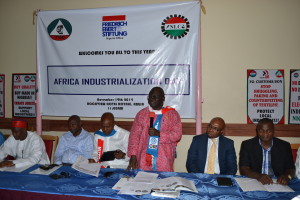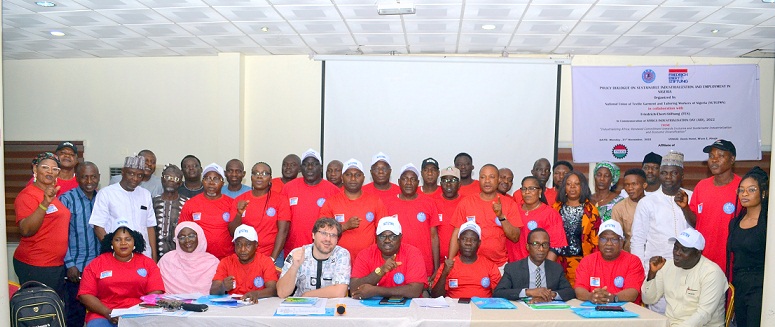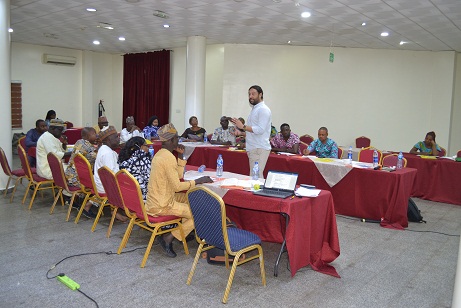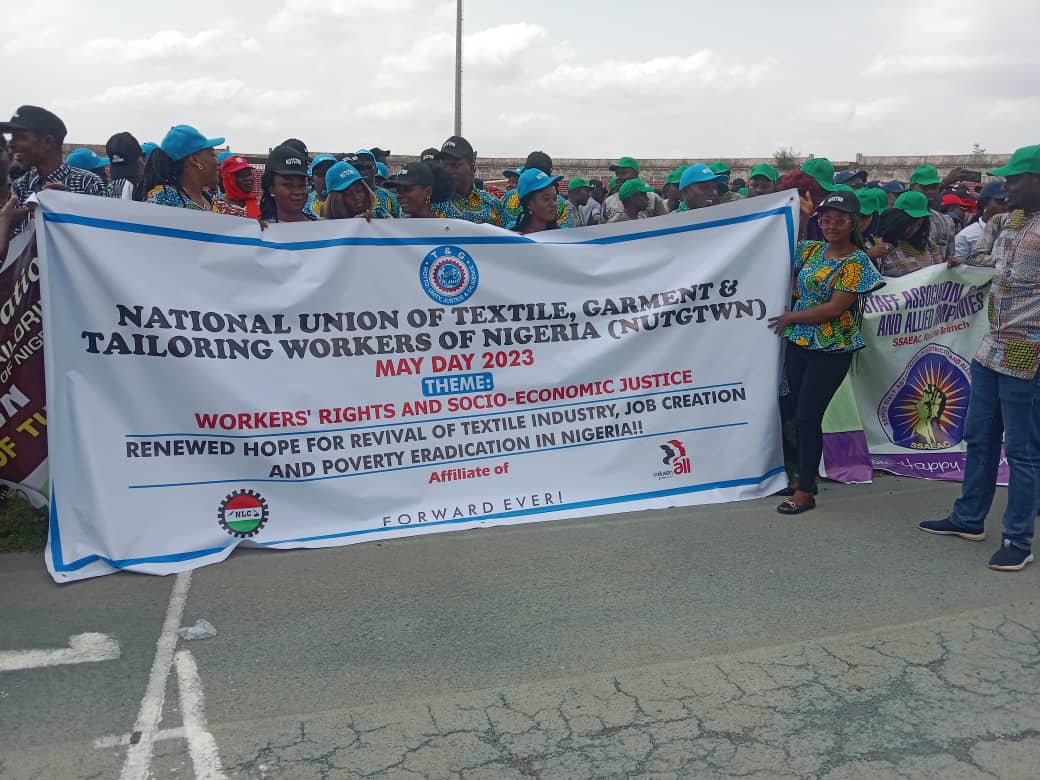INTRODUCTION
•The United Nations General Assembly declared November 20th of every year since 1990 as Africa Industrialisation Day. The 2014 commemoration of the Africa Industrialisation Day takes place under the theme: ‘Inclusive and Sustainable Industrial Development: Africa Agro Industry for Food Security’.
AFRICA INDUSTRIALIZATION DAY
•Africa Industrialization Day is commemorated on November 20 every year. It is a day set aside annually “to stimulate the international community’s commitment to the industrialization of Africa”. It offers an ample time when governments and other critical stakeholders like trade unions in many African countries consider various ways to refine and deepen Africa’s industrialization process. The whole idea is for all the stakeholders to see the need to industrialise the continent.
HISTORY
• In the past 5 years, some select industrial unions in Nigeria that currently belong to IndustriALL Global Union have been observing the day with activities. Sustainable Industrial Development is one of the primary focuses of IndustriALL Global Union. IndustriALL lays emphasis on beneficiation. Africa is endowed with raw materials but not adding value to them. Africa should stop being exporter of raw materials and jobs but producer of manufacturing goods and retainer of jobs.
In the past 5 years, some select industrial unions in Nigeria that currently belong to IndustriALL Global Union have been observing the day with activities. Sustainable Industrial Development is one of the primary focuses of IndustriALL Global Union. IndustriALL lays emphasis on beneficiation. Africa is endowed with raw materials but not adding value to them. Africa should stop being exporter of raw materials and jobs but producer of manufacturing goods and retainer of jobs.
•Two years ago, the trilateral meeting between the NLC, COSATU and Ghana TUC emphasized commitment for the Africa Industrialisation Day. However, since the past three years, Friedrich Ebert Stiftung (FES) has been partnering with the Nigeria trade unions to organize roundtable to mark the day.
•Today as part of the activities in Nigeria to observe tomorrow “Africa Industrialization Day” the Nigeria trade unions notably a select group of private sector trade unions from the Textile, construction, Agricultural, Chemical and Non-Allied, Steel and Engineering, Petroleum and Natural Gas in collaboration with Friedrich Ebert Stiftung (FES) is holding discussion focusing on the recent privatization of PHCN and to x-ray the recently launched Nigeria Industrial Revolution Plan (NIRP) by the Federal government.
•Today’s programme is the third in the series of roundtables organized in collaboration with Friedrich Ebert Stiftung (FES) to mark Africa Industrialisation Day. We thank the FES for the partnership which started with the former Resident Representative Thomas Maeting and continues with the current Resident Representative Mrs. Seija Sturies.
ACHIEVEMENTS
•Critical achievements recorded within this past 4 years of our advocacy include;
i) Official recognition that we must produce what we consume and consume what we produce.
ii) Launching of National Industrial Revolution Plan NIRP focusing on 10 critical sectors that include textiles, food and beverages, chemical, automobile, petroleum sector among others. We call on President Goodluck Jonathan to ensure the full implementation of the NIRP. Labour will partner with government to make sure we realize the vision of NIRP. To this extent, Labour should serve in the presidential advisory council of the NIRP.
iii) Intervention Fund for Textile Industry which has helped to address the problem of financing in the industry.
iv) New policy shift in the automobile industry which puts restriction on importation of different cars to the country.
v) Power sector Reforms – there cannot be industrialization without electrification.
vi) Backward Integration in sub-sectors of the economy especially in agric, cement and sugar production.
vii) Ministry of Industry commitment to Africa Industrialization Day.
•As significant as these achievements are, the current reality is that Africa share of world GDP is still less than 1 per cent.
•Nigerian manufacturing sector has failed to undergo the critical structural transformation necessary for it to play a leading role in economic growth and development. The sector is structurally weak and basic industries such as iron and steel are not fully in place. The technological base for manufacturing is lacking in many sectors.
•The skilled manpower necessary to guarantee competitiveness in today’s dynamic and globalized world is insufficient. Systemic issues of infrastructure, mostly related to power and transport have led to escalating costs and non competitive operations. Consequently, the sector is unable to attract the necessary investment for economic growth and remains a small player in the economy.
In recent years, the sectors share of GDP has remained less than 4 per cent, contributions to foreign exchange earnings have been minimal, and the share of employment and government revenue generated have been low. Significant as these achievements are, however the current reality is;
•Capacity utilization is still very low due to low patronage of goods, power supply crisis among other problems. Nigeria is still having jobless growth. Growth is not driven by manufacturing. Dumping, Counterfeiting and unfair trade practices are still on.
•Even with all the efforts in the Agric sector, our import bill though has reduced but still high. The Minister of Agriculture and Rural Development, Dr Akinwumi Adesina, has disclosed that Nigeria’s food importation bill has reduced by N906 billion from the initial N2.3 trillion. In spite of this commendable reduction, import Bill is still unacceptably high given the capacity of Nigeria for food production and food processing.
•Which makes the theme of this year’s Africa Industrialisation Day ‘Inclusive and Sustainable Industrial Development; Africa Agro Industry for Food Security’ quite timely.
AUSTERITY MEASURE
•The announcement of austerity measure by the Finance Minister Dr. Okonjo Iweala shows Nigeria dependence on oil instead of non- oil sector. Nigeria suffers the problem of resource curse such that a drop in the crude oil price has totally altered the parameters of the annual budget.
•What we need is not austerity measure but accelerated implementation of the Nigeria Industrial Revolution Plan to grow the non- oil sector. We should build on the strengths of Nigeria’s raw materials, large market and abundant and minimize the weaknesses of policy inconsistency and weak Infrastructure to grow the non- oil sector.
SALUTE TO DANGOTE
•We identify with the investment patriotism and pan Africanism of the President/Chief Executive of Dangote Group of industries, Alhaji Aliko Dangote, GCON.
•Africa is a resource rich continent yet it has low levels of industrialization, with materials being exported in its raw form. Labour is excited that Dangote Group of industries is changing the narrative of the continent from that of ‘resource curse’ to resource beneficiation, value addition and mass employment through industrialization and internal articulation of African economy.
•Aliko Dangote is said to be the richest man in Africa. But what is significant for us is that his wealth is based on value adding manufacturing activities ranging from production of cement, sugar and flour among others. The unprecedented investment of $9billion in oil refinery and petrochemical complex in Nigeria by Dangote Group is also highly commendable.
•We also recognize and commend the efforts at the State level particularly of States like Osun with the establishment of Omoluabi Garment factory and Kano State where Governor Rabiu Musa Kwakwanso is setting up garment factories in the 44 local government areas of the state. The Imo State Governor, Rochas Okorocha has also demonstrated commitment to patronize local tailors in the State for sewing of school uniforms as well as setting up of a garment institute in Imo State.







